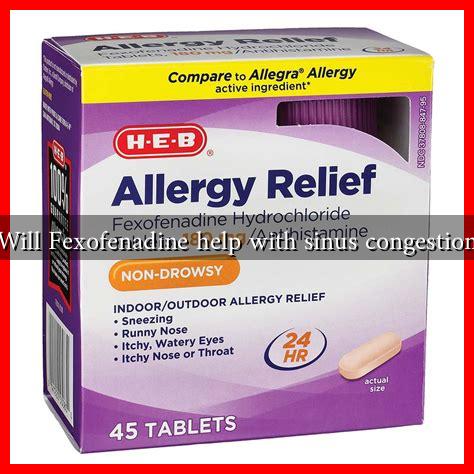-
Table of Contents
Will Fexofenadine Help with Sinus Congestion?
Sinus congestion is a common ailment that affects millions of people worldwide, often resulting from allergies, colds, or sinus infections. Many individuals seek relief through various medications, including antihistamines. One such antihistamine is fexofenadine, commonly known by its brand name Allegra. This article explores whether fexofenadine can effectively alleviate sinus congestion and provides insights into its mechanism, benefits, and limitations.
Understanding Sinus Congestion
Sinus congestion occurs when the nasal passages become swollen or inflamed, leading to difficulty breathing, pressure in the face, and discomfort. The causes of sinus congestion can vary, including:
- Allergic reactions (e.g., pollen, dust mites)
- Viral infections (e.g., the common cold)
- Bacterial infections
- Environmental irritants (e.g., smoke, pollution)
Symptoms often include a runny or stuffy nose, facial pain or pressure, and headaches. While many over-the-counter medications are available, understanding their effectiveness is crucial for effective treatment.
What is Fexofenadine?
Fexofenadine is a second-generation antihistamine that is primarily used to treat allergic rhinitis and chronic urticaria (hives). Unlike first-generation antihistamines, fexofenadine is less likely to cause drowsiness, making it a popular choice for those who need to maintain alertness during the day.
How Fexofenadine Works
Fexofenadine works by blocking the action of histamine, a substance in the body that causes allergic symptoms. When allergens enter the body, histamine is released, leading to symptoms such as sneezing, itching, and congestion. By inhibiting histamine’s effects, fexofenadine can help reduce these symptoms.
Fexofenadine and Sinus Congestion
While fexofenadine is effective in treating allergy symptoms, its role in alleviating sinus congestion specifically is more nuanced. Here are some key points to consider:
- Allergy-Induced Congestion: If sinus congestion is primarily due to allergies, fexofenadine may provide relief by reducing inflammation and mucus production.
- Non-Allergic Causes: For sinus congestion caused by viral infections or other non-allergic factors, fexofenadine may not be as effective, as it does not address the underlying inflammation or infection.
- Combination Therapy: In some cases, fexofenadine may be used in conjunction with other medications, such as decongestants or nasal corticosteroids, to provide more comprehensive relief.
Case Studies and Research Findings
Several studies have examined the effectiveness of fexofenadine in treating allergy-related symptoms, including sinus congestion. For instance, a study published in the Journal of Allergy and Clinical Immunology found that fexofenadine significantly reduced nasal congestion and other allergy symptoms in patients with seasonal allergic rhinitis.
However, research also indicates that while fexofenadine can help with allergy-related congestion, it may not be sufficient for individuals suffering from sinusitis or other non-allergic causes of congestion. A comprehensive approach that includes decongestants or nasal sprays may be necessary for optimal relief.
Conclusion
In summary, fexofenadine can be an effective treatment for sinus congestion when the underlying cause is related to allergies. Its ability to block histamine can alleviate symptoms such as nasal congestion, sneezing, and itching. However, for sinus congestion stemming from non-allergic causes, fexofenadine may not provide adequate relief on its own. Patients are encouraged to consult healthcare professionals to determine the most appropriate treatment plan tailored to their specific symptoms and conditions.
Ultimately, understanding the nature of your sinus congestion and the role of medications like fexofenadine can lead to more effective management and improved quality of life.

